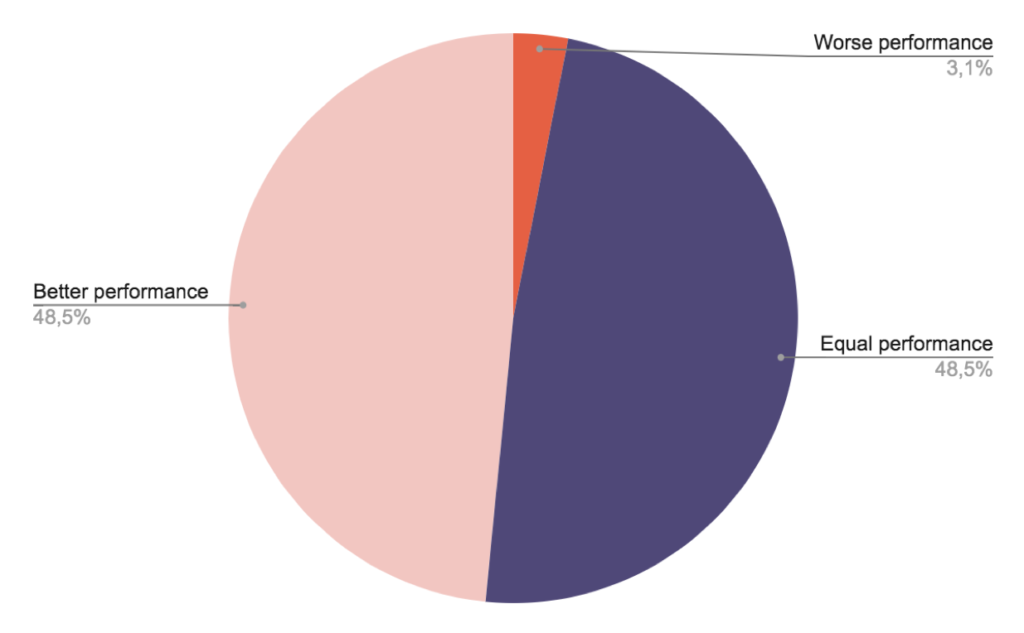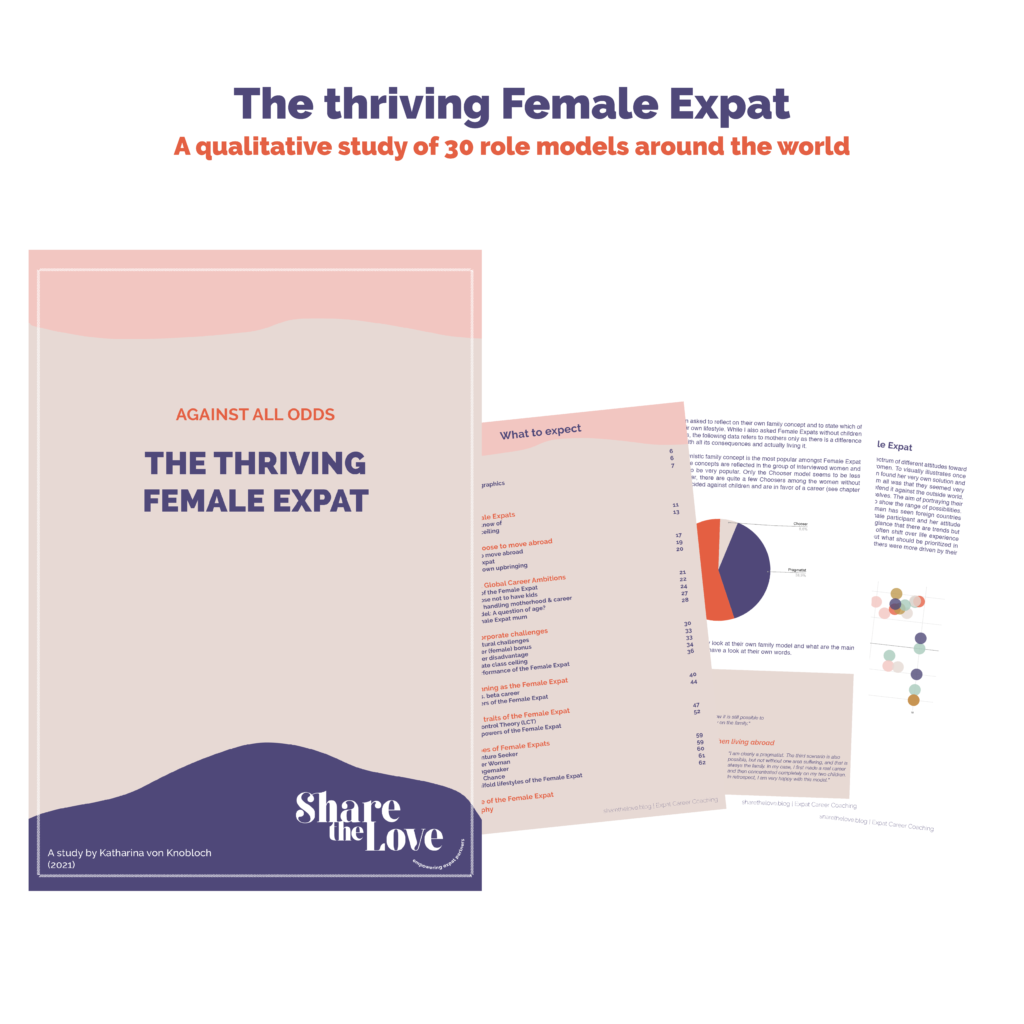
Who performs better at work? Men or women?
In literature, the question has been raised whether women are so underrepresented in international assignments only because their work performance is not equivalent to that of men. So, let’s have a look at the facts and hear what female expats working abroad are having to say about their perceived work performance compared to men.
A qualitative study of 30 role models around the world
I interviewed 30 amazing women working abroad and asked them about global career planning and balancing motherhood and career.
More info here.
It's 2022 - are we still questioning whether women are as good in their job as men?
There are fewer female expats than male expats sent abroad by corporations. That’s a fact (details in my Female Expat Study). Managers and companies alike often shy away to send women abroad. As international assignments are costly, women are seen as a high-risk operation. Managers either see the woman itself as a risk factor or the surrounding context. Arguments often mentioned are physical safety, hazards involved in traveling in developing countries, isolation and loneliness, possible negative reactions of superiors, subordinates, clients, and colleagues towards women in managerial positions (Adler, 1994, Janssens et al. 2006) but also the question whether women can perform as well considering they often also have to incorporate the role as a mother to the business life. So as this is still discussed within companies, let’s have a look again at the studies that already researched this question.
What the latest studies revealed
Let’s have a look at the research around the question of whether women are as suitable as men conducted by Bastida in 2017. The researcher compared the work performance of 139 Spanish medium and high-skilled workers (37 women and 102 men) during their international assignment. Bastida (2017) did not find significant differences between gender: “Overall, it seems that the success of women on global assignments has been generally confirmed.” Instead, it was found that women have an easier time integrating locally and thus indirectly operate more successfully in their projects. Bastida (2017) concludes: “In addition, and in line with these studies, I found that Female Expatriates have significantly higher interaction and work adjustment levels, but also a higher general adjustment level. This finding gives some support to previous research that has suggested that Female Expatriates may be better positioned than men to handle an expatriate assignment.”
Evaluation of own performance by study participants


"In addition, and in line with these studies, I found that Female Expatriates have significantly higher interaction and work adjustment levels, but also a higher general adjustment level. This finding gives some support to previous research that has suggested that Female Expatriates may be better positioned than men to handle an expatriate assignment.”
How do Female Expats perceive the questioning of their work performance?
In my Female Expat Study, I also asked how the women assessed their work performance compared to male colleagues. The reactions ranged from the thoughtful reflection of their own work performance to quick, self-confident evaluations or even irritation to the fact that this is even a question.
For many women, it is a matter of course that their work performance is equal, if not better, and they justify this with better education or higher soft skills and efficiency.
While just under half of the respondents rated their job performance as equal, the other half rated their job performance as better. Only one respondent rated her work performance worse, which was explained by being less present at work due to breastfeeding.
"For many women, it is a matter of course that their work performance is equal, if not better, and they justify this with better education or higher soft skills and efficiency."

How becoming a mum interferes with your work assessment
Not surprisingly, the fact whether the woman had children plays a huge role in her own assessment of work performance. Women without children were significantly more self-confident than mothers. 75% of women without children stated that their work performance was better than men, while only 28% of mothers said the same. At the same time, motherhood affects how committed women are to their profession. For example, several women report that they increased their work effort to compensate for the fact that they are perceived as mothers and not committed employees.
Single parents also report that the lack of a partner takes up working time. Mothers seem to have to prove themselves more and therefore invest more effort in their daily work.

In her own words
My favorite part of the study are the quotes as these women say it best. Here are some insights and opinion referring to their work performance :
Felt urge to compensate for being a woman by working harder than men
“I go the extra mile, because I have to prove myself as a woman again and again. Means more energy input, pay much more attention to details and what is between the lines. I work harder to get positive feedback. Especially to get recognition in these „old white man“ circles, or a certain standing, which is essential in my job.”
Perceived equal perception of work performance with male colleagues
“In Germany I had many male colleagues where the performance was completely the same and here abroad my doctor (boss) trusts me as much as a man.”
Equal work performance in general but better implementation with soft skills
“I would classify my work performance as higher simply because I have a different spectrum of possibilities at
my disposal. Men often act
only through the instrument of hierarchy. I don’t need hierarchy to gain respect. I am very self-confident and can resolve conflicts beyond levels of hierarchy. I have a more diverse methodology at my disposal.”
“In general, I think that women are better in terms
of team leadership and education and have a more relevant point of view because they are less focused on their own ego. I consider myself democratic, equal/ better than men, but I don’t want to compare that by gender but rather by person.”
“Women value different things than men and my industry is dominated by men and men prefer more classic male characteristics.”
“I don’t think there is a difference here. But I see a difference if you are a single parent or not.”
<Laughs at statement> “My work performance is excellent. This statement is totally bullshit. It has more to do with the project and whether I am interested in it.”
“My performance is about equal, maybe slightly better. Men need a lot more management, especially as a female leader. I also think men tend to talk more about the efforts they make, and women only bring it up when it’s contextual (you hear about it after the fact). It varies from culture to culture as well. Definitely worked harder than male colleagues from Southern Europe, but those from Central and Eastern Europe and Northern Europe, we were contributing the same.”
“In Oman even better because most of the men are not so well educated and also can not communicate so strongly. The eagerness to work is also different. I am very fast and efficient, I am also emotional which many men are not and is a strength in tourism – we sell emotions.”
From the statements in this chapter, one can see that while the system is not predominantly female-friendly, these Female Expats found their own way to succeed. Whether they took matters into their own hands or focused on the work itself, these 30 women overcame all structural barriers by being devoted, resilient, and self-confident. While cultural and gender obstacles do exist, they do not lead to resignation. Where does resilience come from? Why is having a global career important for these women, and what career drivers do they have? More about that in my full Female Expat Study that I offer for free download here.
My aim with this Female Expat Study is to contribute to a more equal workforce in international assignments. Hence, I shed light on the top 3 reasons why there are so few Female Expats abroad and tested those reasons with the 30 thriving Female Expats I interviewed for the study. There is so much to learn from their personal experience and each of these women paved the way for future generations.

A qualitative study of 30 role models around the world
I interviewed 30 amazing women working abroad and asked them about:
– What was your motivation to go abroad?
– Can you have it all? A successful career and a family?
– How do you deal with the opinions of friends and family back home?
– What makes you thrive in your career?
More info here.










